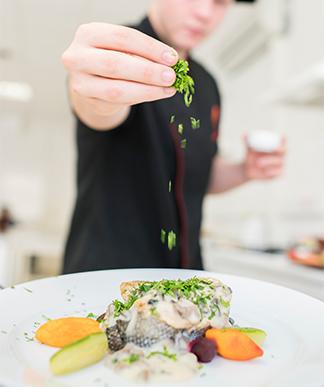
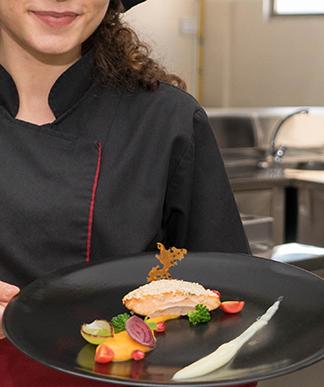
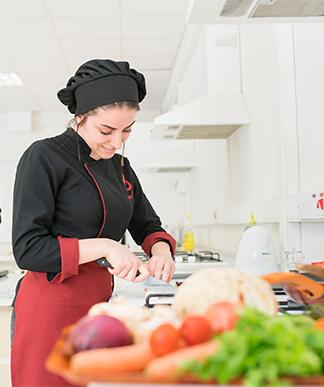
About the Program
Gastronomy program of the School of Tourism and Hotel Management aims to train future chef candidates. The program achieves this goal through harmonizing theory and practice utilized in the gastronomy sector. The program also concentrates on the deliverance of materials that focus on local and world cuisines and leadership styles which will lead students to possess national and international competitive and competent skills. Gastronomy Bachelor’s Program aims to nurture individuals who are experts and possess the abilities of the know-how in the field. It is one of the targets of the program to train students who are aware of the global developments in their fields and can establish a network with the sector professionals. In order to increase culture and cuisine appreciation, students attend workshops and seminars that are organized throughout the program.
Education Opportunities
Gastronomy Program is designed to enhance and maintain the aesthetic level of the intended culinary culture. Gastronomy is an ideal choice for those who want to improve themselves in both cooking and culinary business. Gastronomy Program of the School of Tourism and Hotel Management provides a superior infrastructure and superstructure for those who are interested in the sector. It offers students opportunities to work at famous restaurants in the country or abroad. The program offers students the chance to blend theoretical knowledge with applied skills. There is also a restaurant and guest house within the university where students work as part of the weekly work experience/internship course.
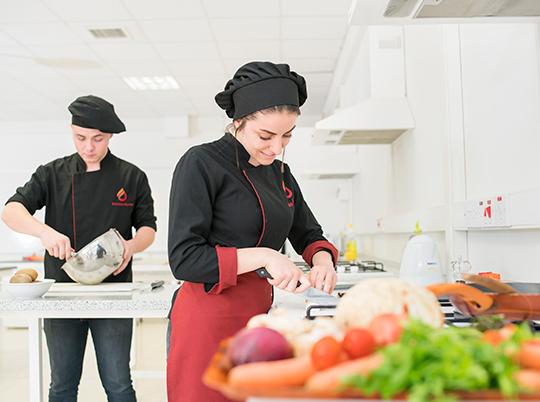
Career Areas
Gastronomy experts are employed in the tourism, travel or transportation sectors, where plenty of posts are available in restaurants or hotels which are highly competitive in finding the best gastronome experts on the market. Students have the opportunity to work in large restaurants or banquette halls. Gastronomy specialists can also work in food factories where there is a need for sustainably healthily produced foods. In addition, graduates may find jobs in the catering or food manufacturing industries. Students may also pursue a doctoral title in this area by completing additional masters and doctoral degrees. Further opportunities arise in the areas of sustainable food, food journalism, food policy and tourism.
Contact
School of Tourism and Hotel Management
Graduate Sciences and Education Center, GE126
Tel: +90 392 671 1111 Extension: 2391
Faculty E-mail: secretary-sthm@ciu.edu.tr
Director E-mail: hozgit@ciu.edu.tr
Compulsory Courses
First Semester
READING AND WRITING SKILLS-I
Course code
ENGL141Credit
3Theoretical
2Practical
2Ects
4INTRODUCTION TO GASTRONOMY AND CULINARY
Course code
GACA101Credit
3Theoretical
3Practical
0Ects
5FOOD PRODUCTION IN GASTRONOMY- I
Course code
GACA103Credit
3Theoretical
3Practical
0Ects
5CULINARY TECHNIQUES-I
Course code
GACA105Credit
3Theoretical
3Practical
0Ects
6WEEKLY JOB EXPERIENCE IN CULİNARY ARTS-I
Course code
GACA151Credit
0Theoretical
0Practical
0Ects
1INTRODUCTION TO COMPUTERS
Course code
ITEC110Credit
3Theoretical
3Practical
0Ects
4NUTRITION, HYGIENE AND SANITATION
Course code
NUTR150Credit
3Theoretical
3Practical
0Ects
3TURKISH LANGUAGE
Course code
TREG100Credit
0Theoretical
2Practical
0Ects
2TURKISH
Course code
TURK100Credit
0Theoretical
2Practical
0Ects
2Second Semester
READING AND WRITING SKILLS-II
Course code
ENGL142Credit
3Theoretical
2Practical
2Ects
4FOOD TECHNOLOGY FOR GASTRONOMY AND CULINARY ARTS
Course code
GACA102Credit
3Theoretical
3Practical
0Ects
6FOOD PRODUCTION IN GASTRONOMY-II
Course code
GACA104Credit
3Theoretical
3Practical
0Ects
5CULINARY TECHNIQUES-II
Course code
GACA106Credit
3Theoretical
3Practical
0Ects
6KITCHEN AND FOOD TERMINOLOGY
Course code
GACA108Credit
3Theoretical
3Practical
0Ects
6WEEKLY JOB EXPERIENCE IN GASTRONOMY-II
Course code
GACA152Credit
0Theoretical
0Practical
0Ects
1HISTORY OF CIVILIZATION
Course code
HIST100Credit
0Theoretical
2Practical
0Ects
2MODERN TURKISH HISTORY
Course code
TARH100Credit
0Theoretical
2Practical
0Ects
Third Semester
PRINCIPLES OF ACCOUNTING FOR FOOD AND BEVERAGES
Course code
ACFN205Credit
3Theoretical
3Practical
0Ects
6PROFESSIONAL CULINARY ARTS ENGLISH-I
Course code
ENGL209Credit
3Theoretical
2Practical
2Ects
4FREE ELECTIVE
Course code
FREEXX1Credit
3Theoretical
3Practical
0Ects
5FOOD AND BEVERAGE SERVICES
Course code
GACA201Credit
3Theoretical
3Practical
0Ects
7FOOD PRODUCTION IN GASTRONOMY–III
Course code
GACA203Credit
3Theoretical
3Practical
0Ects
5WEEKLY JOB EXPERIENCE IN GASTRONOMY-III
Course code
GACA251Credit
0Theoretical
0Practical
0Ects
1Fourth Semester
PROFESSIONAL CULINARY ARTS ENGLISH-II
Course code
ENGL210Credit
3Theoretical
2Practical
2Ects
4FREE ELECTIVE
Course code
FREEXX2Credit
3Theoretical
3Practical
0Ects
5SUMMER TRAINING-I
Course code
GACA200Credit
0Theoretical
0Practical
0Ects
5FOOD AND BEVERAGE MANAGEMENT
Course code
GACA202Credit
3Theoretical
3Practical
0Ects
7FOOD PRODUCTION IN GASTRONOMY-IV
Course code
GACA204Credit
3Theoretical
3Practical
0Ects
5PURCHASING AND COST CONTROL IN FOOD AND BEVERAGE BUSINESSES
Course code
GACA206Credit
3Theoretical
3Practical
0Ects
5WEEKLY JOB EXPERIENCE IN GASTRONOMY-IV
Course code
GACA252Credit
0Theoretical
0Practical
0Ects
1Fifth Semester
FREE ELECTIVE
Course code
FREEXX3Credit
3Theoretical
3Practical
0Ects
6TURKISH CUISINE CULTURE
Course code
GACA301Credit
3Theoretical
3Practical
0Ects
4FOOD PRODUCTION IN GASTRONOMY-V
Course code
GACA303Credit
3Theoretical
3Practical
0Ects
5WEEKLY JOB EXPERİENCE IN GASTRONOMY-V
Course code
GACA351Credit
0Theoretical
0Practical
0Ects
1FOOD LEGISLATION
Course code
ILAW323Credit
3Theoretical
3Practical
0Ects
6UNIVERSITY ELECTIVE-I
Course code
UNISXX1Credit
3Theoretical
3Practical
0Ects
6Sixth Semester
FREE ELECTIVE
Course code
FREEXX4Credit
3Theoretical
3Practical
0Ects
6SUMMER TRAINING-II
Course code
GACA300Credit
0Theoretical
0Practical
0Ects
5HUMAN RESOURCE MANAGEMENT IN FOOD AND BEVERAGE INDUSTRY
Course code
GACA302Credit
3Theoretical
3Practical
0Ects
5FOOD PRODUCTION IN GASTRONOMY-VI
Course code
GACA304Credit
3Theoretical
3Practical
0Ects
5DESSERT AND PASTRY ARTS
Course code
GACA306Credit
3Theoretical
3Practical
0Ects
4WEEKLY JOB EXPERIENCE IN GASTRONOMY-VI
Course code
GACA352Credit
0Theoretical
0Practical
0Ects
1UNIVERSITY ELECTIVE-II
Course code
UNISXX2Credit
3Theoretical
3Practical
0Ects
6Seventh Semester
KITCHEN PLANNING AND DESIGN
Course code
GACA401Credit
3Theoretical
2Practical
2Ects
6FOOD PRODUCTION IN GASTRONOMY-VII
Course code
GACA403Credit
3Theoretical
3Practical
0Ects
6BAKERY PRODUCTION
Course code
GACA405Credit
3Theoretical
3Practical
0Ects
5WEEKLY JOB EXPERIENCE IN GASTRONOMY-VII
Course code
GACA451Credit
0Theoretical
0Practical
0Ects
1SCHOOL ELECTIVE-I
Course code
GACAXX1Credit
3Theoretical
3Practical
0Ects
6SCHOOL ELECTIVE-II
Course code
GACAXX2Credit
3Theoretical
3Practical
0Ects
6Eighth Semester
FOOD PRODUCTION IN GASTRONOMY–VIII
Course code
GACA404Credit
3Theoretical
3Practical
0Ects
5GARDE MANGER
Course code
GACA406Credit
3Theoretical
3Practical
0Ects
6ETHICS AND SOCIAL RESPONSIBILITY IN FOOD AND BEVERAGE BUSINESSES
Course code
GACA408Credit
3Theoretical
3Practical
0Ects
6WEEKLY JOB EXPERIENCE IN GASTRONOMY-VIII
Course code
GACA452Credit
0Theoretical
0Practical
0Ects
1SCHOOL ELECTIVE-III
Course code
GACAXX3Credit
3Theoretical
3Practical
0Ects
6SCHOOL ELECTIVE-IV
Course code
GACAXX4Credit
3Theoretical
3Practical
0Ects
6Elective Courses
FOOD ANTHROPOLOGY
Course code
GACA102Credit
3Theoretical
3Practical
0Ects
6PRINCIPLES OF MARKETING IN FOOD AND BEVERAGE BUSINESSES
Course code
GACA207Credit
3Theoretical
3Practical
0Ects
5BREAKFAST COOKING
Course code
GACA446Credit
3Theoretical
3Practical
0Ects
5BANQUET MANAGEMENT
Course code
GACA307Credit
3Theoretical
3Practical
0Ects
5LEISURE AND RECREATION MANAGEMENT
Course code
TRHM441Credit
3Theoretical
3Practical
0Ects
6HEALTH TOURISM
Course code
TRHM415Credit
3Theoretical
2Practical
1Ects
5FOOD TECHNOLOGY FOR GASTRONOMY AND CULINARY ARTS
Course code
GACA443Credit
3Theoretical
3Practical
0Ects
5BUTCHERY
Course code
GACA447Credit
3Theoretical
3Practical
0Ects
6Vegetarian Cuisine
Course code
GACA441Credit
3Theoretical
3Practical
0Ects
5WINE SCIENCE
Course code
GACA308Credit
3Theoretical
3Practical
0Ects
6TR Applicants
TR Students who are successful in the exams conducted by the Higher Education Council Student Selection and Placement Center (ÖSYM) and are entitled to enroll in our university in line with their preferences can complete the registration process with the necessary documents for registration from our Registration and Liaison Offices throughout Turkey or from the Marketing Directorate on campus.
Click for detailed admission requirements information.
TRNC Applicants
TRNC citizens and TR citizen candidate students who have completed their entire high school education in TRNC. They are placed in undergraduate programs in line with their success in the CIU Student Placement and Scholarship Ranking Exam and the programs they prefer.
Students who are successful in the exam can register from the TRNC Marketing Office.
Applicants can directly apply online to our undergraduate programs using the application portal. Please fill in your details correctly and upload all the required documents listed on the last page of the application form.
Required documents;
- Completed application form,
- Higher/Secondary Certificate or equivalents (e.g. O/A’Level, WAEC/NECO),
- Evidence of English Language competence: TOEFL (65 IBT) or IELTS (5.5). Students without these documents will take the CIU English proficiency exam on campus following arrival,
- Scanned copy of international passport/birth certificate,
- Fully completed and signed CIU Rules and Regulations document (which can be downloaded during the online application).
Cyprus International University provides academic scholarships for its students as an incentive for success, with most students benefiting from 50%, 75% or 100% scholarships or discounted tuition fees. Click for more information.
Tuition Fees are determined at the beginning of each academic year. Candidate students who are entitled to enroll in CIU can learn their fees in line with the Tuition Fee Calculation system.
The objectives of the Gastronomy and Culinary Arts program are as follows:
- To provide successful entrepreneurs, managers, employees and academicians for academic and industrial fields thanks to its high-quality education.
- To build an ability to gain knowledge about the core business of related sectors and businesses.
- To equip students with basic sectorial knowledge through related courses such as food production, food and beverage management, culinary skills, accounting and cost control in food and beverage.
- To increase the capability of students to evaluate food and culinary related concepts, to search and determine new trends and topics, to discuss related issues, and to offer solutions based on evidence and research.
- To bring students with sector executives, help students make more networks and develop relationships with different sector stakeholders.
Students who graduated from the Gastronomy and Culinary Arts program will be able to;
PO1: Recognize the Turkish and global cuisine and techniques associated to these cuisines.
PO2: Contribute to the exploration and conservation of Turkish cuisine.
PO3: Globally promote the recognition of rich Turkish cuisine.
PO4: Internalize the health and safety protocols as the focus of their food studies.
PO5: Compete at national and international scales.
PO6: Pursue the quality and high standards from raw material to the fork.
PO7: Organize and manage catering events.
PO8: Develop skills to make a team, take on responsibility as well as comply with organizational hierarchy.
PO9: Adopt and apply the essential principles of national and international cuisines.
PO10: Apply food and beverage cost control methods.
PO11: Develop skills to identify and solve problems within professional practices.
PO12: Plan and maintain the professional processes.
PO13: Acquire and develop entrepreneurial ability.
PO14: Develop skills to recognize and practice social and ethical responsibilities.
PO15: Have a knowledge of a foreign language at a basic level.
Students are obliged to do an internship in accordance with the provisions of the Directive in order to be able to apply the theoretical knowledge they have acquired during their undergraduate education in the sector, to improve their working skills and communication networks, to gain work experience and to graduate from the relevant program. The total internship period that students enrolled in Cyprus International University Gastronomy and Culinary Arts Department are required to complete is 80 working days throughout their undergraduate education. Students registered to the program will be able to do internships during the summer months after the final exams following the 4th and 6th academic semesters.
Students who have reached an agreement with the institution where they will do their internship must submit the compulsory internship approval form (approved by the workplace or institution) to the internship commission for approval and deliver it to the commission at least fifteen business days before the start date of the internship.
- Click to download the Internship Approval Form, which must be filled out (signed and stamped) before the start date of the internship.
- Click to download the Internship Report, which must be filled out during the internship by the student.
- Click to download the Trainee Evaluation Form, which must be filled out by the employer/manager/authorized person by the end of the internship.
- Click to download the Student’s Opinion of Internship form, which must be filled out by the student by the end of the internship.
- Click to download the Commission Decision Form, which must be included in the internship file; yet will be filled out by the commission members.
- Click to download the Cover Page of the internship file.
| Graduate | Name Surname | Experience |
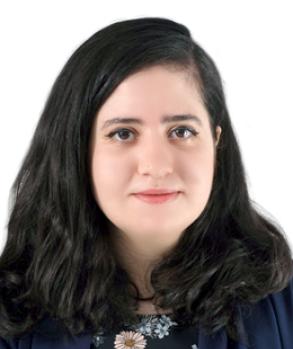 |
Fatima Amahri |
During the period from 2019 to 2023, the academic pursuit at CIU for a Bachelor's degree in Gastronomy and Culinary Arts provided a transformative experience. The comprehensive curriculum, guided by seasoned chefs and enriched by practical internships, played a crucial role in honing culinary skills and knowledge. |
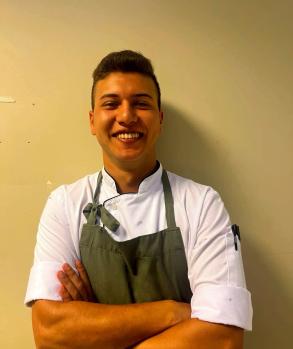 |
Taha Doğan | I am Taha Doğan, a last year student at Cyprus International University Department of Gastronomy and Culinary Arts. Last summer, I took the opportunity to do my internship at Kitchen Bodrum, owned by Osman Sezener, within The Bodrum Edition hotel. During the internship period, our team was deemed worthy of receiving a Michelin Star. Through this process, I learned to manage the stress and excitement in the kitchen, as well as to take responsibility. Additionally, I changed my perspective on the dynamics and relationships within the kitchen. I became more aware about what I want to do and understood that this job is not individual but a team effort. I aimed to improve myself in many areas during the internship process, and I succeeded. It was a fruitful internship experience for my future endeavors. |